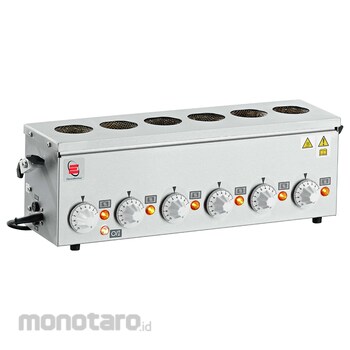TEquipment Micro Kjedahl
#Grup produk P109407957
Spesifikasi
| Electrical Requirements Voltage (V) | 230 |
|---|---|
| Dimensions (mm) | 160x520x162 |
| Element Temperature Range (°C) | 550 to 800 |
| Case Material | Stainless Steel |
| Thermal Insulation | Ceramic Fibre Mineral Wool |
| Clamps for Support Rods | Fitted With Adjustible Brackets Which Accept The Supplied Fume Tube Holders |
| # Positions (Life Sciences) | 6 |
| Capacity Included (Life Sciences) (ml) | 50 |
| Electrical Requirements Frequency (Hz) | 50 60 |
| Electrical Requirements Power (W) | 600, UK Plug |
| Number of Wells | 6 |
| Voltage (Life Science) (VAC) | 208-240 Only |
| Well Capacity (ml) | 18-50 |
Pilih jenis produk yang diinginkan
| Nomor SKU | Model Number | Masa Persiapan Barang | Harga | Jumlah |
|---|---|---|---|---|
| Loading... | ||||
Informasi Produk
Description
UK Plug Micro-Kjeldahl Extraction Heater
Each heating mantle has its own energy regulator incorporating an On/Off switch and a "Mains to Heater" amber neon indicator. There is also a "Mains On" clear neon indicator on the front panel.
The lower part of the unit houses dedicated controllers for each recess. This "cool zone" housing is separated from the heating elements by a stainless steel screen and a well-ventilated air space. The heating element consists of thermally insulated element wire stitched into a cartridge, and operates up to a temperature range of 550°C to 800°C maximum.
The MM Micro-Kjeldahl Equipment models incorporate an earth screen to protect the user from electric shocks and are double-fused for extra safety. The rugged stainless steel outer casing is durable and easy to clean.
Kjeldahl Method for Protein Content
The method consists of heating a substance with sulphuric acid, which decomposes the organic substance by oxidation to liberate the reduced nitrogen as ammonium sulphate. In this step potassium sulphate is added to increase the boiling point of the medium (from 169°C to 189°C). Chemical decomposition of the sample is complete when the medium has become clear and colourless (initially very dark).
The solution is then distilled with sodium hydroxide (added in small quantities) which converts the ammonium salt to ammonia. The amount of ammonia present (hence the amount of nitrogen present in the sample) is determined by back titration. The end of the condenser is dipped into a solution of boric acid. The ammonia reacts with the acid and the remainder of the acid is then titrated with a sodium carbonate solution with a methyl orange pH indicator.
Degradation: Sample + H2 SO4 --> (NH4)2 SO4 + CO2 + SO2 + H2 O
Liberation of ammonia: (NH4 ) 2 SO4 + 2NaOH --> Na2 SO4 + 2H2 O + 2NH3
Capture of ammonia: B(OH)3 + H2O + NH3 --> NH4 + B(OH)4 –
Back-titration: B(OH)3 + H2O + Na2 CO3 --> NaHCO3 + NaB(OH)4 + CO2 + H2 O
The Kjeldahl method’s universality, precision and reproducibility have made it the internationally-recognized method for estimating the protein content in foods and it is the accepted standard method.
Each heating mantle has its own energy regulator incorporating an On/Off switch and a "Mains to Heater" amber neon indicator. There is also a "Mains On" clear neon indicator on the front panel.
The lower part of the unit houses dedicated controllers for each recess. This "cool zone" housing is separated from the heating elements by a stainless steel screen and a well-ventilated air space. The heating element consists of thermally insulated element wire stitched into a cartridge, and operates up to a temperature range of 550°C to 800°C maximum.
The MM Micro-Kjeldahl Equipment models incorporate an earth screen to protect the user from electric shocks and are double-fused for extra safety. The rugged stainless steel outer casing is durable and easy to clean.
Kjeldahl Method for Protein Content
The method consists of heating a substance with sulphuric acid, which decomposes the organic substance by oxidation to liberate the reduced nitrogen as ammonium sulphate. In this step potassium sulphate is added to increase the boiling point of the medium (from 169°C to 189°C). Chemical decomposition of the sample is complete when the medium has become clear and colourless (initially very dark).
The solution is then distilled with sodium hydroxide (added in small quantities) which converts the ammonium salt to ammonia. The amount of ammonia present (hence the amount of nitrogen present in the sample) is determined by back titration. The end of the condenser is dipped into a solution of boric acid. The ammonia reacts with the acid and the remainder of the acid is then titrated with a sodium carbonate solution with a methyl orange pH indicator.
Degradation: Sample + H2 SO4 --> (NH4)2 SO4 + CO2 + SO2 + H2 O
Liberation of ammonia: (NH4 ) 2 SO4 + 2NaOH --> Na2 SO4 + 2H2 O + 2NH3
Capture of ammonia: B(OH)3 + H2O + NH3 --> NH4 + B(OH)4 –
Back-titration: B(OH)3 + H2O + Na2 CO3 --> NaHCO3 + NaB(OH)4 + CO2 + H2 O
The Kjeldahl method’s universality, precision and reproducibility have made it the internationally-recognized method for estimating the protein content in foods and it is the accepted standard method.
Feature
- Rugged, easy to clean stainless steel construction- Back-mounted brackets hold flask support rods (supplied with each unit)
- 6 positions which can accommodate flasks of between 18 - 50ml capacity
- Maximum element temperature range of 550°C to 800°C
Ulasan Produk
Tidak ada ulasan






















































































































































